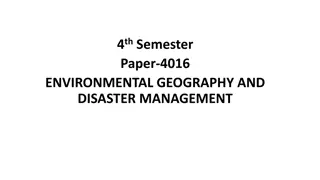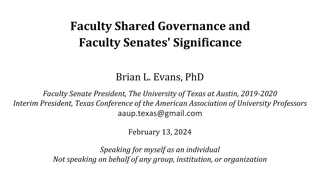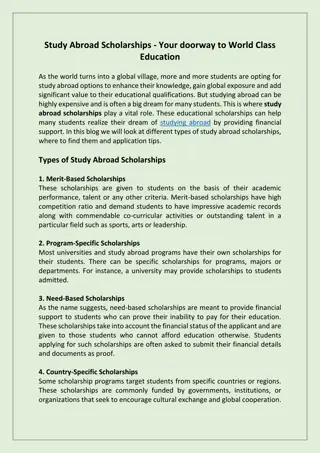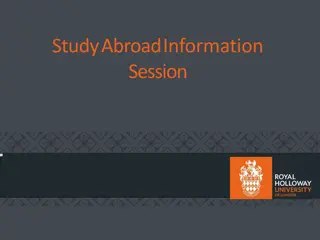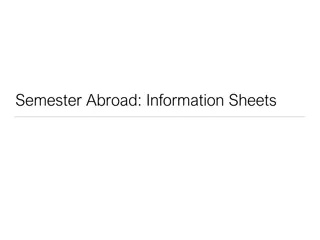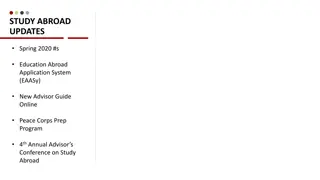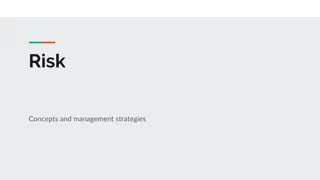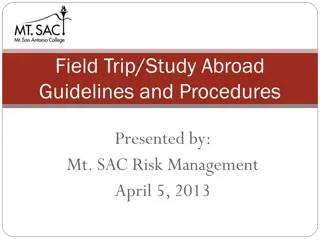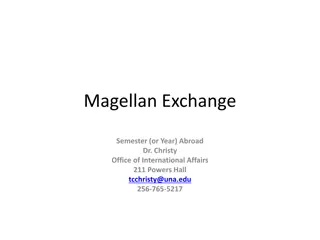Comprehensive Guide to Faculty-Led Study Abroad Program Risk Management
This guide provides valuable insights into common problems, scenarios, prevention strategies, program planning, itinerary considerations, and pre-departure measures for faculty-led study abroad programs. It covers aspects like lost luggage, departure issues, safety concerns, communication plans, student well-being, itinerary planning, and destination considerations to ensure a smooth and safe educational experience.
Download Presentation

Please find below an Image/Link to download the presentation.
The content on the website is provided AS IS for your information and personal use only. It may not be sold, licensed, or shared on other websites without obtaining consent from the author.If you encounter any issues during the download, it is possible that the publisher has removed the file from their server.
You are allowed to download the files provided on this website for personal or commercial use, subject to the condition that they are used lawfully. All files are the property of their respective owners.
The content on the website is provided AS IS for your information and personal use only. It may not be sold, licensed, or shared on other websites without obtaining consent from the author.
E N D
Presentation Transcript
Faculty-Led Study Abroad Pre-Departure and Risk Management CIE Study Abroad
SCENARIOS Common Problems for students 1. Lost Luggage 2. Departure Problems 3. Debit/Credit Card Issues 4. Demonstrations, Protests, Riots
SCENARIOS What you need to be prepared for: 1. Robbery 2. Assault 3. Injury/Illness and Mental Health Worst Case Scenario: 1. Missing Student 2. Death of a student -traffic accidents (pedestrian) -drowning
PREVENTION The best time to address common health and safety concerns is during the planning phase of your program. Main factors to consider: Road travel outline your travel plans; does time of day determine the route/travel option? In many locations, traveling at night may not be the best option. Have alternative travel plans or alternative plans in case an emergency occurs at night, or if your program requires long-distance travel. Communication with students plan for frequent informal/formal communication with students prior to, during, and after your program; have an emergency communication plan in place if a natural disaster or political event were to disrupt phone/internet communication Communication with CIE Study Abroad - plan for frequent communication with the office prior to, during, and after your program; have an emergency communication plan in place if a natural disaster or political event were to disrupt phone/internet communication Routes and travel to health organizations/professionals outline your travel routes and consider alternative methods of travel if a natural disaster, political event, or time of day were to affect modes of transportation
Program Planning Destination concerns: Know the potential health and safety concerns of your location Weather, walking/hiking conditions, water/food Road travel safety You need to consider the factors that will impact the physical, mental and emotional health of your students Student concerns: What kind of student will your program attract? What kind of student do you expect? How do we best work with these students to ensure a successful program?
Itinerary Your itinerary needs to reflect a well-timed program Time for reflection (both in a group and individual) Time for travel Scheduled downtime to allow everyone to recharge Remember this is 24/7 togetherness! Students will bicker with you and each other
CIE Pre-Departure Students will attend pre-departure with CIE Study Abroad and other students We will give them country specific information regarding immunizations, weather, etc. It is recommended you do additional follow-up with students Address any specific health concerns they have Outline expectations for student behavior/conduct On-site orientation for students upon arrival
How you can prepare Be proactive not reactive Know the location of the US Embassy Understand the health insurance coverage Always have emergency plans with students Meeting location Contact information (back-up ways to communicate) In case of emergency: document and communicate with CIE
Planning for Safety Resources U.S. Department of State: www.travel.state.gov Travel warnings, public announcements, consular information sheets, background information sheets Students register: http://studentsabroad.state.gov/ OSAC www.osac.gov CDC http://www.cdc.gov/ WHO http://who.int/en/ Mental health Be prepared mentally and physically before you leave. Stress of traveling can intensify current mental/physical health issues
HTH Worldwide Covers up to $500,000 Up to $5,000 if someone needs flown to you (in hospital week or more) Will not cover injuries sustained while participating in a riot or civil commotion Does not cover high risk activities Driving, scuba diving, sky diving, parasailing, hang gliding, parachuting, bungee jumping NO DRIVING
HTH resources Hthstudents.com Find hospitals, doctors, pharmacies from their portal Insurance card Recommend students print and have on hand Remind students to take ownership of their health
Documentation An incident report is included in your handbook Contact CIE immediately and document the incident in writing Who, where, when, how, why as many details as possible
Communication Communication is key both with CIE and with your students Contact us as soon as you are safe/stable Follow-up and debrief with students after any incident regardless of how minor it may seem Do not communicate with the media if you are contacted, direct them to Mike Counter
Student behavior: Alcohol & Drugs Model appropriate social behavior Alcohol and Safety Video University of Texas Austin Alcohol is usually a factor when students find themselves in danger while abroad. Alcohol and drug laws differ in other countries Ensure students know how these differ and what that means for them Why the behavioral expectations are important
Student Behavior & Conduct Remind students to remember they are subject to host country s laws and regulations They do not receive special treatment because of US citizenship Violation may lead to deportation, arrest, or imprisonment Remind students: Know the rules and laws of your host country Learn the necessary phrases in your host country s language Exercise sound judgment, common sense, and responsibility
What we tell students Encourage students to submit HIPAA forms to medical providers Take ownership of your health If you have health conditions or other circumstances that require special attention, you must note this on your Medical Report Health issues and illness abroad Water and food Culture-shock related illnesses Drugs and alcohol Be aware of your host country s laws regarding drugs, alcohol and prescription medication
Your Health Immunizations What s required? When do you need them? Centers for Disease Control & Prevention Prescriptions Plan (with your doctor, the consulate, and HTH Worldwide) to ensure that you can have access to your medication Is your medication legal and can you can the necessary amount with you? Pack medication in your carry-on luggage Keep all medications in their original containers
Final thoughts The onus is on students to take responsibility for their health and safety. We need your support to give them the information they need to make informed decisions while studying abroad. It can be stressful traveling with students 24/7 but also incredibly rewarding.
What we will provide Emergency contact information for all students Campus emergency contact information Resources for finding country/city specific information Additional sessions with students regarding health and safety Up-to-date insurance information for your reference Pre-departure and re-entry for students





